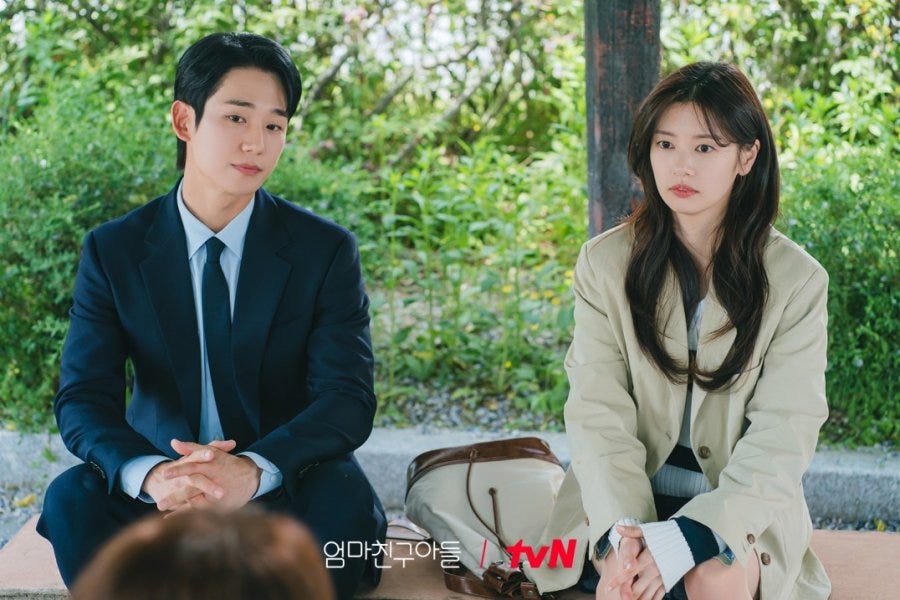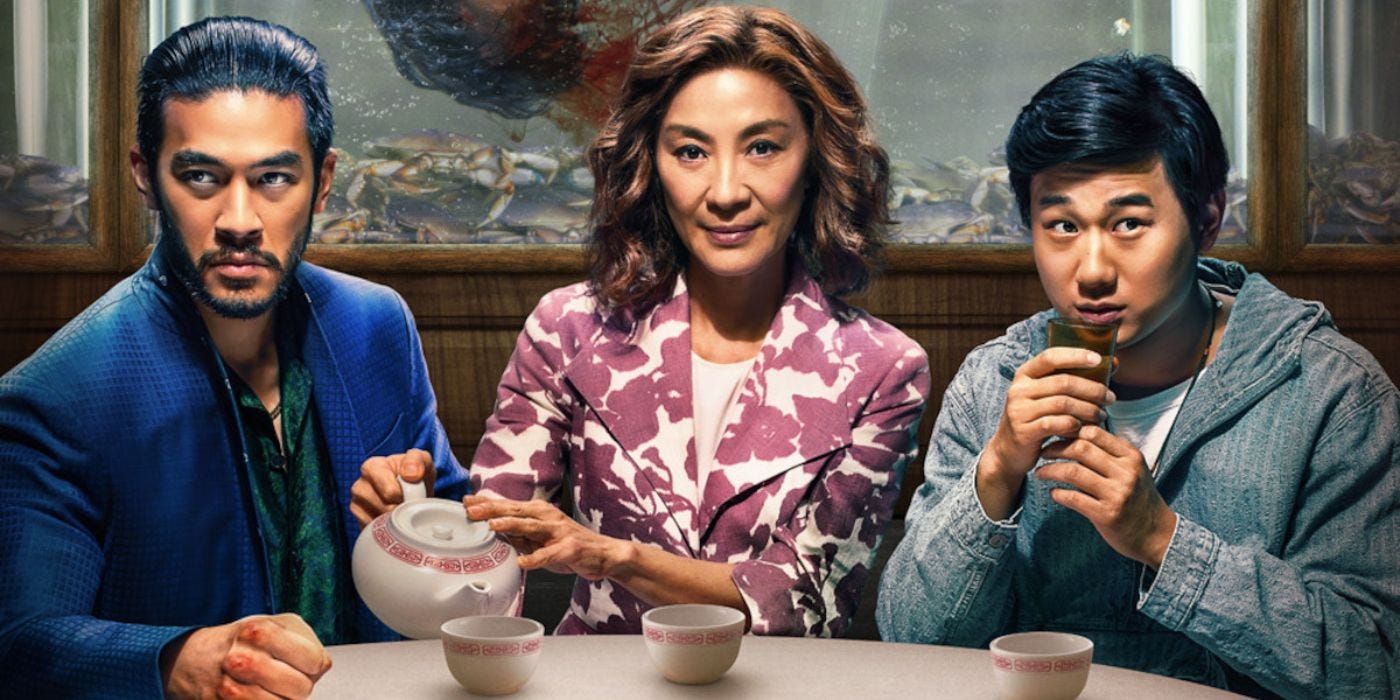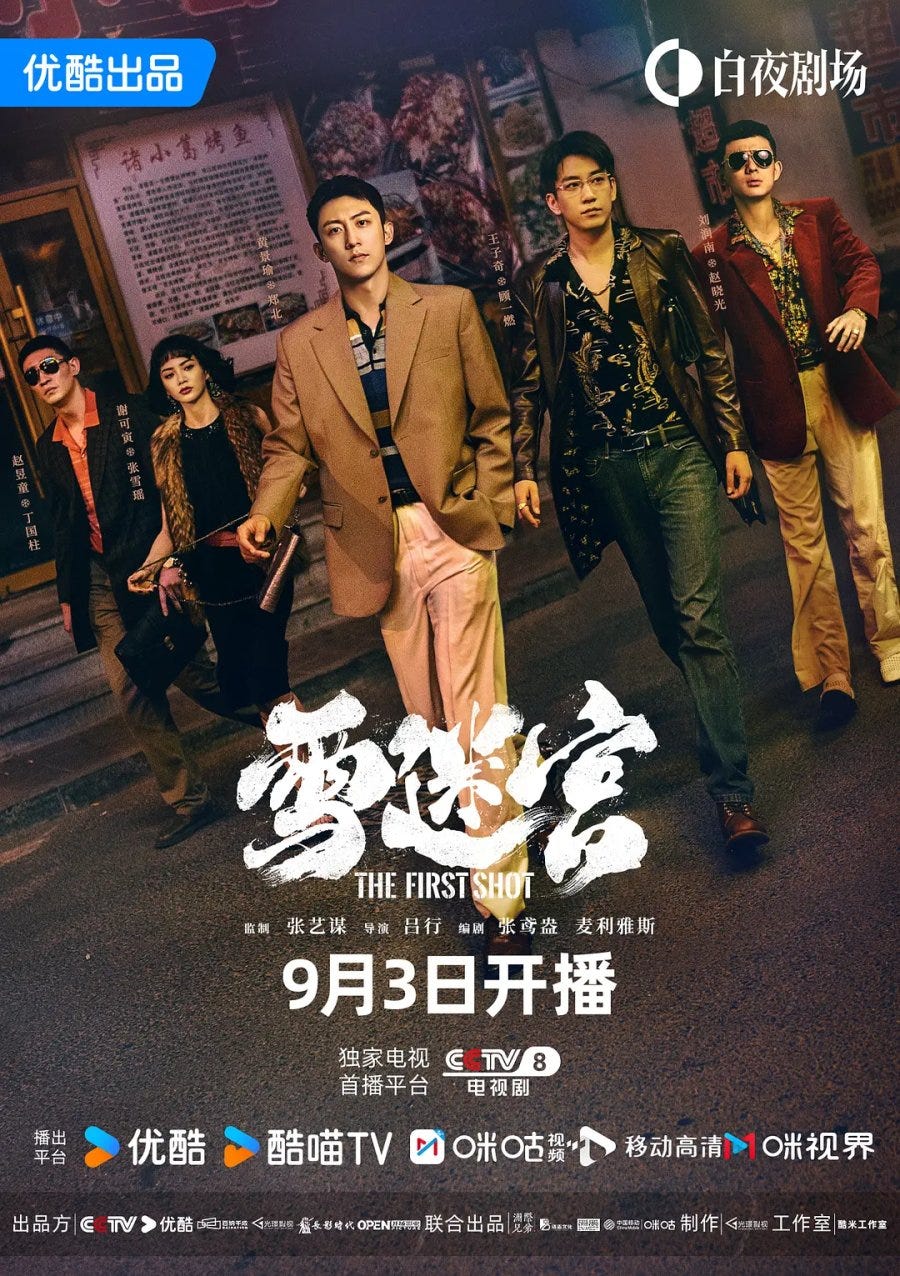My Week with Dramas 30 September 2024
Love Next Door Episodes 1-10, The Brothers Sun, The First Shot
Jung Hae-in and Jung So-min are the titular neighbours in the Netflix slice-of-life romance, Love Next Door. While the drama doesn’t do much that’s different from dozens upon dozens of K dramas of its kind, it manages to hit all the right notes with its authentic, grounded build up of characters who have known each other most of their lives. For instance: How is it a self-styled sophisticated diplomat can be the lifelong friend of a boisterous loud-mouth part owner of a mum and pop eatery? They fight and brag in tiresome fashion about their overachieving children. Anyone who doesn’t know better might think them bitter rivals but when push comes to shove, their families are there for each other.
In the best way possible, the show is carved from the mould of the great Taiwanese friends-to-lovers story, In Time With You. Yet it is its own thing. Two young people now in their 30s who grew up together, went to the same school, went their separate ways and find their way back to each other eventually. It’s a popular Asian drama trope but not every show pulls it off with authenticity. Success begins and ends with the characters written with a nuanced touch. One fact underpins this task: People are both simple and complex at the same time. Warts and all. The writing more or less reflects that. The motivations are clearly laid down and the choices make sense from their perspective except that this show isn’t about cheerleading a single perspective
Jung So-min’s Bae Seok-ryu is an intermittently exasperating character partly because she is an oldest high achieving child in a working class family and the weight of expectations have fallen disproportionately on her capable shoulders. Less is expected of her brother who grew up sickly and so he’s been allowed to fritter away his time. For the longest time Seok-ryu doesn’t tell anyone why she really broke off her engagement and quit her job in the US. At first it seems like she’s burnt out from juggling too much in her US stint but as it turns out, there’s much more than meets the eye. In reality, Seok-ryu is afflicted with a martyr complex. It manifests as a form of noble idiocy. Sure, no responsible person wants to be a burden to others but the fact that human beings are mostly born into families with a gestational period of 9 months should inform us that it is not our lot in life to suffer alone. In the New Testament, Paul says in one of his letters that the universal church, the body of Christ as members who rejoice and suffer together. (“If one member suffers, all suffer together; if one member is honored, all rejoice together”) This is what an ideal community looks like. Apart from the fact that noble idiocy ignores the other parties’ agency, it also denies something innate about being human in a fallen world. Life isn’t a bed of roses and it is unhelpful to shield fellow adults from unpleasantness that comes with living.
The advantage of slice-of-life storytelling is mainly in its psychological exploration. The dictum that the characters are their own worst enemy is the rhyme that keeps repeating. Sure there might be external challenges to be overcome but it is the hot water that reveals the quality of the tea.
The leads are doomed to play push and pull for a bit. Seung-ho has finally plucked up courage to confess but Seok-ryu can’t/ won’t give him the answer he wants. She’s been burnt before and I’m certain she’s terrified to lose their friendship which is why they’ve hesitated about transitioning into a dating relationship. It’s a bit inconvenient too when exes show up and one initially is led to believe that it’s about triangles, polygons and good o’l jealousy to spur the leads into action. But no, the appearances of a former girlfriend and ex-fiance is about the need for everyone to move on and to change with the passage of time. It’s also about milestones and signposts. The characters “collect” experiences that will hopefully help them make better decisions down the line. Apparently the path to “true love” is a windy one with plenty of distractions/hurdles along the way.
Cute are the reporter and the leads’ childhood paramedic friend. Romance is in the air for both as Mo-eum tries to sort out her feelings. Is it love? Or just a biological reaction to him being around. In the more recent episodes she is playing hide and seek due to sheer embarrassment of smooching him in a drunken moment. Their adorable stress-free romance comes packaged with a little girl. He’s a busy single dad covering neighbourhood happenings while she’s a busy paramedic saving lives. Mo-eum who is into superheroes had an encounter with a real life one she named Mudflat Man. It’s love at first sight but she didn’t realise it was her friendly neighbourhood Mudflat Man that she fell for unmasked as the very friendly reporter that lives next door.
So it’s fate… stupid. Fate can come quickly. Fate can be painfully slow. Que sera sera… So the story goes.
Completed The Brothers Sun just the other day and concluded that it’s less of a crime show than an immigrant’s story dressed up in crime duds. My China-born dentist didn’t much care for what he saw expecting something a bit more gritty and bleak. There’s certainly plenty of humour on offer although not everything lands perfectly. It lacks polish from the script up to the performances but then are some relatable heartwarming moments to make up for the show’s deficiencies. The gangster/triad backdrop isn’t entirely decorative but there’s something over the top cartoony about it despite the egregious bloodletting. The immigrant experience varies widely as I can personally attest, but the intergenerational conflict that is highlighted here, is more or less on the money. The much talked about “Tiger Mother” is real and Michelle Yeoh does a decent impersonation of one having already rehearsed for the role in Everything, Everywhere, All At Once. Eileen married to the leader of the Jade Dragons has two sons, Charles (Justin Chien) and Bruce (Sam Song Li) who couldn’t be more different. A hit has been made on Dad aka Big Sun in Taiwan and Charles heads to LA to make sure that Mum and Bruce don’t become casualties of a gangland turf war Charles is convinced that it’s the shenanigans of a rival gang but Eileen who is more savvy than your average working mother, is not so sure.
The disruption to the LA branch of the family draws attention from various quarters including the law enforcement alphabet soup. Eileen is not impressed and thinks that Bruce, the med student, should just stay out of things. The thing is, Bruce just want to be an improv actor but he can’t give Mum the bad news. Charles is surprisingly good at being a pastry chef but he’s also the infamous Chairleg Sun, the chief enforcer of the Jade Dragons. The family is a morass of competing expectations, resentment and unspoken longing. The dynamics do play out in both comedic as well as emotionally arresting ways.
The show should be enjoyed for what it is — a family romp with hijinks cop show tropes to keep you on your toes somewhat. It was made with affection and probably not that much money. As someone who grew up listening to 4 languages routinely, the best part of the series was the code-switching — a multilingual behaviour of immigrants — adding to the verisimilitude.
Johnny Huang has certainly carved up a career for himself playing tough guys. In The First Shot, he is Zheng Bei, a well-regarded late 1990s narcotics detective who is coming to grips with the growing market for synthetic recreational drugs like meth. He is ordered to seek the services of chemistry professor Gu Yiran at the police academy played by Wang Ziqi. The two don’t clash as one might expect but the rest of his team look at Teacher Gu with a leery eye. As far as they’re concern the egghead doesn’t belong in field work and they find his lectures sleep-inducing. For the most part it’s good-natured ribbing but the lads and lass don’t see the point of all that book learning. Plus they find the final addition to the team… an odd personality.
The First Shot has a raw rustic feel that adds to it authenticity. The northeastern Halan set looks lived in including the delivery van that Zheng Bei drives around looking almost as sturdy as Mr Bean’s little Mini. Zheng Bei is an effable fellow with lots of common sense although it does seem at times like he’s herding teenagers rather than leading a team of professionals. Aspects of it remind me of Ordinary Greatness from a couple of years ago and also Chief Detective 1958. While it is a police procedural on some level, the pacing marks it out more as a slice-of-life drama in the vein of Ordinary Greatness. The characters are stock standard for a modern police procedural — the sagacious team leader, the brash loud mouth, the hothead, the muscle and the nerds.
If you enjoyed reading this and other posts, please like, share leave a comment below. Please consider subscribing.





